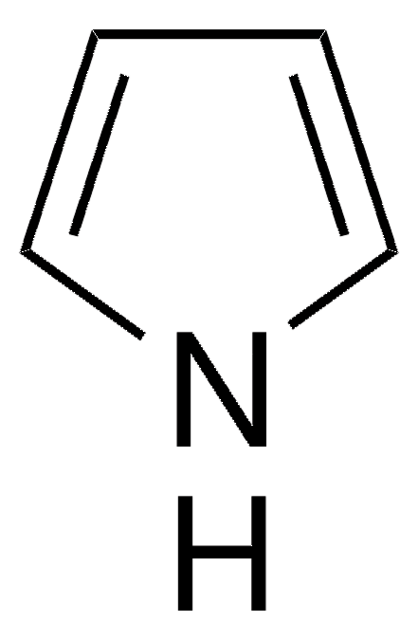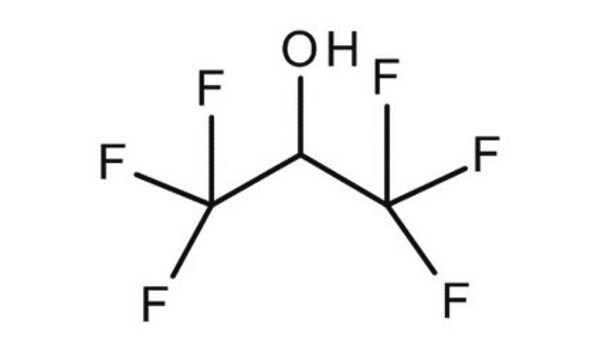About This Item
Recommended Products
vapor pressure
8.7 hPa ( 20 °C)
Quality Level
Assay
≥97.0% (GC)
form
liquid
autoignition temp.
550 °C
potency
137 mg/kg LD50, oral (Rat)
expl. lim.
3.10-14.8 % (v/v)
pH
>6 (20 °C, 10 g/L in H2O)
bp
130-131 °C/1013 hPa
mp
-24 °C
transition temp
flash point 39 °C
density
0.97 g/cm3 at 20 °C
storage temp.
2-8°C
InChI
1S/C4H5N/c1-2-4-5-3-1/h1-5H
InChI key
KAESVJOAVNADME-UHFFFAOYSA-N
Application
- Therapeutic potential of pyrrole and pyrrolidine analogs: This review highlights the significant therapeutic potential of pyrrole derivatives, particularly in pharmacological contexts, underscoring their importance in drug development (Basha et al., 2022).
- Living on pyrrolic foundations–Advances in natural and artificial bioactive pyrrole derivatives: Discusses the role of pyrrole as a crucial building block in bioactive compounds, emphasizing its versatility and broad application range in medicine and synthetic chemistry (Domagala et al., 2015).
- Active methylenes in the synthesis of a pyrrole motif: Reviews recent advancements in synthesizing pyrrole motifs using active methylenes, crucial for developing pharmaceuticals and optoelectronic materials (Khajuria et al., 2016).
- Bioactive pyrrole-based compounds with target selectivity: Focuses on pyrrole-based compounds in drug discovery, highlighting their efficacy and target selectivity which are pivotal in the development of new therapeutics (Petri et al., 2020).
- Pyrrole as a promising electrolyte additive to trap polysulfides for lithium-sulfur batteries: Explores the use of pyrrole in enhancing the efficiency of lithium-sulfur batteries, demonstrating its utility beyond pharmaceutical applications (Yang et al., 2017).
Analysis Note
Density (d 20 °C/ 4 °C): 0.967 - 0.971
Identity (IR): passes test
Signal Word
Danger
Hazard Statements
Precautionary Statements
Hazard Classifications
Acute Tox. 3 Oral - Acute Tox. 4 Inhalation - Eye Dam. 1 - Flam. Liq. 3
Storage Class Code
3 - Flammable liquids
WGK
WGK 2
Flash Point(F)
96.8 °F - closed cup
Flash Point(C)
36 °C - closed cup
Certificates of Analysis (COA)
Search for Certificates of Analysis (COA) by entering the products Lot/Batch Number. Lot and Batch Numbers can be found on a product’s label following the words ‘Lot’ or ‘Batch’.
Already Own This Product?
Find documentation for the products that you have recently purchased in the Document Library.
Customers Also Viewed
Our team of scientists has experience in all areas of research including Life Science, Material Science, Chemical Synthesis, Chromatography, Analytical and many others.
Contact Technical Service








